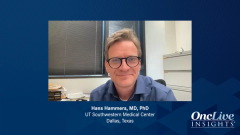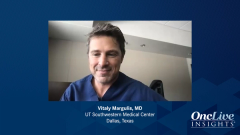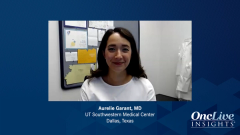
Scenario 3: A 44-Year-Old Woman With RCC at Intermediate-High Risk for Recurrence
Expert panelists highlight aspects of a final patient scenario, discussing adjuvant treatment strategies in the setting of renal cell carcinoma at intermediate-high risk for recurrence.
Episodes in this series

Transcript:
Hans Hammers, MD, PhD: Let’s go to the third case. This is now a different era with adjuvant therapies, so let’s talk about this. This 44-year-old [woman] presented with a right lower pole mass, measuring 6.9 cm. She had a right radical nephrectomy, and pathological staging was pT3a, with invasion of the perinephric fat, negative surgical margins, grade 2 of 4, and nothing suspicious for metastatic disease. Dr Margulis, before I continue on the case, what kind of risk would you quote this woman for recurrence?
Vitaly Margulis, MD: This is stage 3, grade 2 RCC [renal cell carcinoma]. There are several tools one can use, [such as] Mayo [imaging] classification, [Union for International Cancer Control], or [University of California, Los Angeles] nomogram. There’s several prognostic tools, [and] I believe there are several others out there. You can plug in things like stage, grade, size of the tumor, and presence of other various pathological features and come up with a prediction of recurrence. I would predict that this person has a 30% probability of systemic recurrence in 5 years.
Hans Hammers, MD, PhD:I totally agree. To be honest with you, for disclaimer, I often don’t use those tools. I just do it over the thumb. If somebody has stage 3 disease, good risk is to be [approximately] 30%. If it’s high grade, it moves more in the direction of [approximately] 50%. If lymph nodes are involved, that’s bad news. That’s roughly how I look at those patients.
So [there’s] no evidence for metastatic disease, and she was very anxious. She wanted to do everything she could to reduce the risk of recurrence, and she initiated adjuvant pembrolizumab [Keytruda], with dosing every 3 weeks. But we had every 3-week follow-ups just to keep an eye on her, at least in the first few months until she declares herself with regards to [adverse] effects or not. She is obese and has some preexisting osteoarthritis. She developed this progressive joint pain that she had before, but to a level she hadn’t experienced before, causing her significant discomfort. So we made a referral to rheumatology. Imaging studies that we continue on the study didn’t show any disease progression, and she initially continued on immunotherapy. But over time, her joint pain got worse. Even the rheumatologist, who initially treated her symptomatically for suspected osteoarthritis, started to believe that there was now an inflammatory component here that warrants immune modulation—in this case, with leflunomide [Arava]—for inflammatory arthritis. So immunotherapy was discontinued, and we will just observe her now as per standard of care.
Dr Margulis, I know you also were involved in some of the studies with adjuvant therapy. In fact, first of all, you helped us recruit a lot of patients to KEYNOTE-564 [NCT03142334] and other studies. So just a reminder for the audience, this was the first phase 3 trial to demonstrate a disease-free survival benefit for patients who received pembrolizumab for 1 year vs placebo. There was [approximately a] one-third reduction in the risk of recurrent disease [and] no worse benefit at this time—and that, we will have to see [whether] this will ever come to fruition—but [there was] clearly a reduction. There were several other trials that were presented in a very large session at [Anatolian Society of Medical Oncology], and they were all negative. Dr Margulis, what are your thoughts on that? I know you were involved with PROSPER [NCT02003924], as well.
Vitaly Margulis, MD: Yes, I think at least some of that has to do with patient selection. In this clinical trial, there were patients [who] were enrolled with no positive disease [who] were resected. Also, [there were] patients enrolled in what’s called M1-NED [no evidence of disease]—patients [who] are actually metastatic and had a complete surgical consolidation—and they were enrolled in this clinical trial, which is why this clinical trial derives its positive benefit. I think this is the group that drives the results of this clinical trial. A lot of these results probably depend on what kind of patients you select. If you select this trial—also separate from selection of some of the patients [who] are probably at a lot less risk for systemic recurrence—of adjuvant pembrolizumab, [it] allowed selection of patients with pathologic T2 disease [who] were high grade and kind of low-volume T3 disease. These patients are probably at a lower end of probability of recurrence and probably were overtreated by this. I suspect that the patients [who] were in M1-NED or node-positive disease were probably undertreated. So for clinical trials, I think trial design and patient selection play a huge role in the types of results we’re going to see.
Hans Hammers, MD, PhD:Several trials were done. One of them was PROSPER that you were very involved with, which was a neoadjuvant treatment with nivolumab [Opdivo]….This trial also allowed non–clear cell [RCC]. A patient with the disease or disease group that might be less sensitive to immune checkpoint inhibition. Clearly, patient selection made a difference. One trial that nobody understands why it’s negative is adjuvant nivolumab, ipilimumab [Yervoy]. That trial still has 1 arm we need to hear from, which is nivolumab monotherapy. But a very curious constellation, if you will, of a good number of large phase 3 clinical trial is negative and 1 being positive. Nonetheless, the data [are] very clear for this particular trial and clearly is an option and is FDA [Food and Drug Administration] approved. What are your thoughts? Also, Dr Garant, let’s say if this trial continues to and has clearly demonstrated [disease-free survival] benefit, but the OS [overall survival] benefit would not be there. Would that change your enthusiasm for this, or would [this trial] have no effect on the use of adjuvant immunotherapy? Obviously, you can get [adverse] effects from using immunotherapy in the setting.
Aurelie Garant, MD: That’s a great question. [This is] definitely not a conversation I entertain routinely with my patients. But seeing [that] the selection of the positive trial is slightly different than the others, it’s definitely a weighted conversation to be had with your patient. Checking with what their other competing health issues might be. If your patients have a lot of other health concerns, that could also drive their personal decision to pursue regular infusions. So, yes, it’s a really interesting topic and [I’m} eager to get some updated outcomes.
Hans Hammers, MD, PhD:I totally agree. It’s one of my longest visits in the clinic, because I don’t just say, “You need to do adjuvant therapy,” or “Don’t do it.” I say, “Here [are] the data; it has certain pros and cons. Yes, I can reduce your recurrence, but if you give [adjuvant therapy] super early, I am unclear [whether] it’s going to be that much more effective than waiting for it to recur. On the other hand, [with] waiting for a recurrence, you may get a lesion somewhere that you don’t really want, like in your spine. So there’s a certain risk associated with that.” And in my experience, patients will pick their own poison, if you will. Patients come into my office often with an opinion [on whether] they want to do something or not, or they just want to hear it but are hesitant about it. Without an obvious benefit, I don’t twist anyone’s arm, because it’s not clear that we are going to improve over survival. In that space, patients will choose what they want to do. Do they want to sit tight and just be under the microscope for some years, or do they want to engage with immunotherapy at the earliest possible point? These are all things we still need to figure out.
Transcript edited for clarity.





































